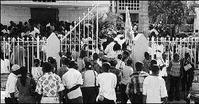Glenda Anderson, Staff Reporter 

Hundreds of farm work applicants converged at the St Paul's United Church in Montego Bay in this 2005 photo. Over the years, thousands of Jamaicans have been recruited by US and Canadian companies to work on farms. - File
A sixty-five-year-old Jamaican farm worker - who does not want his identity disclosed - was recruited under the H-2A Agricultural programme by Florida Fruit and Vegetables Association in Orlando Florida, in November 1982 until 1989, and was assigned to the Sugar Cane Growers' Cooperative.
Back then, all he needed was the will to work and a good, strong frame. So the young man from Moneague in St Ann, jumped at the chance.
But, he remembers, the early days were tough.
"Oh Lord, it was really bad. Sometimes it takes you all a day and half to cut one row if the cane is bad, like if them fall down or wet, and we use to cut it two row at a time."
after 9/11
Workers were paid $40 for each row, which ran some 2,700 feet, or half a mile.
"They gave us a permit but then the permit (was) cancelled, because they say 'cane not perishable', so they basically drop the programme. After that, we couldn't get anything because they take away the ID and the permit. I couldn't go back home because I had nothing there to fall back on. Then after 9/11, everything come crashing down; nobody would hire you without papers. All I had was a driver's licence, and they even took that away."
"Is a good thing I learnt a trade - carpenter/mason. I do everything, so that's what I fall back on. But you cyaan go to look work - you have to wait for people to call yuh," he tells The Sunday Gleaner.
By this time, his wife back home in Jamaica had died and their nine-year-old child had been entrusted to the care of an aunt.
"There was no violation because they told us that under the programme, if you cut the cane for eight seasons, you could get a work permit to stay. We went to immigration and they gave it to us, and we got a Social Security number, so we thought we were all right. All the other people who didn't get a permit had to leave," the former farm worker recounts.
"In St Ann, I have around six grandkids I haven't seen. Everyday I promise them that I am coming home, but I can't. I just say it to make them feel good. It's real embarrassing. Sometimes I say, if I could just find a lawyer, I would follow it up, but one man alone can't do it," he adds.
one of the lucky ones
Still, he is one of the lucky ones for whom some assistance is being realised. A letter he sent to the Jamaican Ministry of Labour's umbrella group in the US, Jamaica Central Labour Organisation, received some attention a year later, and he is well on the way to being reprocessed. He has since applied for a Jamaican passport.
Another former farm worker, who requested anonymity, was recruited in 1990, and worked for two years on his authorisation card before he was told the programme had closed down. He accepted jobs with other private companies, hoping to qualify under the Special Agricultural Worker provision. Today, he struggles to meet his daily needs.
it's getting hard
"I file my taxes every year, but it's getting hard. If I could accumulate some money here, I would go home. Everything here you have to buy, and my salary can't make it."
He is one of the luckier field hands, receiving a salary of US$250 each week. His rent is US$280 per month, with light bill between US$60 and US$80 each month.
"I have 10 kids in Jamaica; the last one was three years old when I left. I haven't been back since. Now they are big men and women and they hardly know me," he says.
The men say the group was abandoned by Jamaican representatives.
When pressed as to why the recruiting office refused to assist the workers, Cecil Weir, deputy liaison officer for Jamaica's official recruiting agency in North America, Jamaica Central Labour Organisation (JACLO), responds: "That would be taking on something that we don't have authorisation for; we cannot operate outside of our status. Of course, we got the inquiries, and where we could help, like providing letters, we did, but there were some that just made you sad - like some who had reached an age where they were asking about pension, but there's not much we can do. We referred them to the Kingston (National Insurance) office."
Jamaica's consul general in Miami, Ricardo Allicock, says while the office has been aware of the Jamaican community in Belle Glade and Clewiston for some time, none of the workers had contacted the consulate for help.
"The consulate has not been approached by either displaced workers or the Jamaica Central Labour Organisation to lend assistance in mediating discussions between the workers and sugar-cane industry employees," Allicock tells The Sunday Gleaner. "However, the mission stands at the ready to lend its resources to the JACLO and the Ministry of Labour should a request be received," he adds.
no confirmation
Allicock says further that his office had investigated and not found any instance of workers living without basic amenities.
"Our investigations have not been able to confirm this allegation," a statement from the consulate reads. In a later response, the consulate says it is now "in discussions with the Ministry of Labour and the JACLO on the present situation".
Allicock says while his office is unable to offer economic assistance to the former farm workers, private individuals or groups should help where they are able.
glenda.anderson@gleanerjm.com

